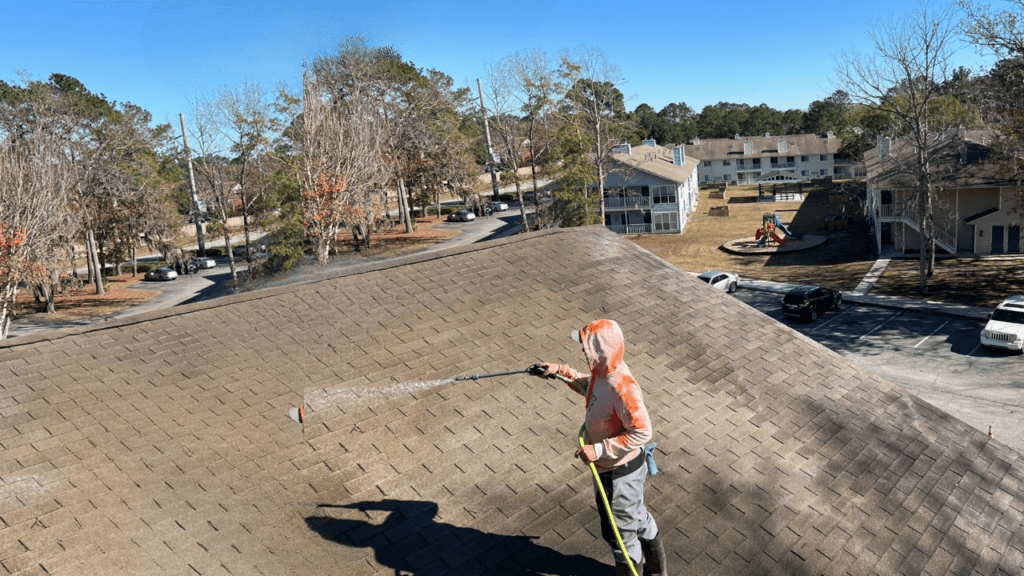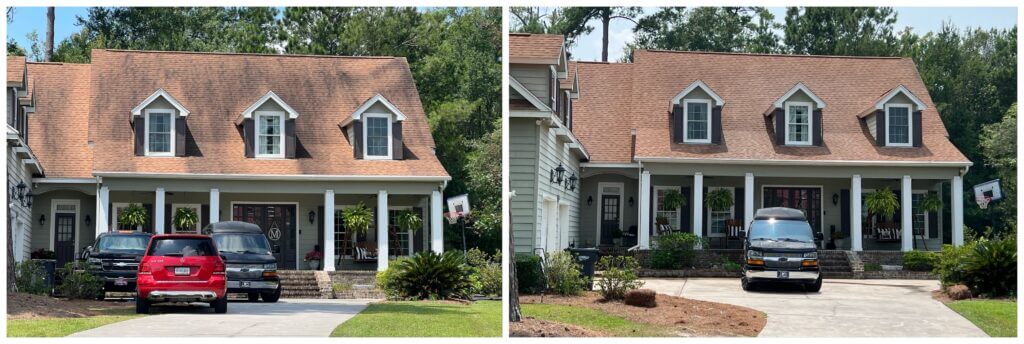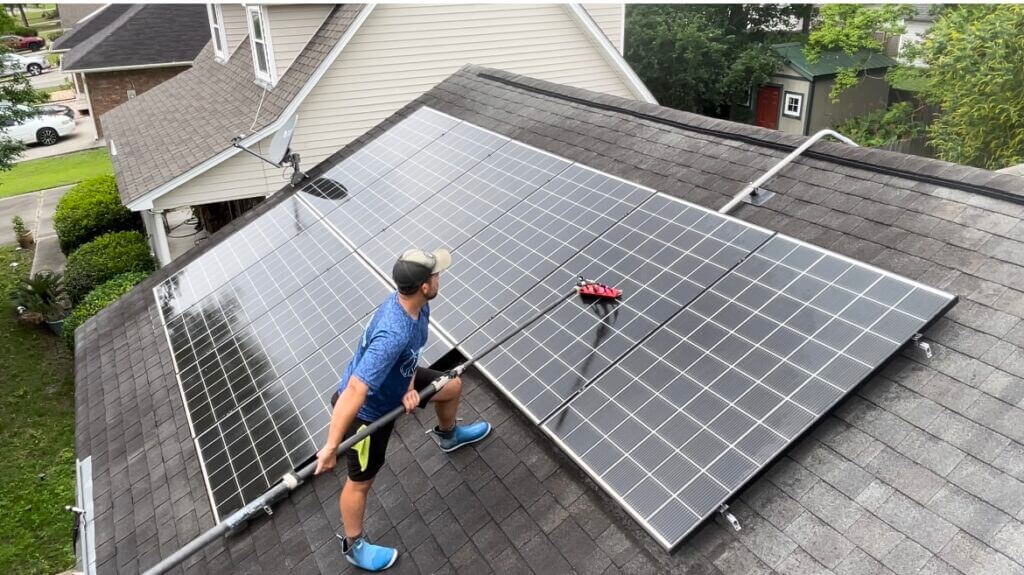
Has your roof lost its former glory? It might be time for some much-needed attention. In this article we will discuss how and why to softwash a roof.
Tucked quietly above, your roof stands as a silent guardian, shielding your home from the relentless forces of nature. Yet, like any unsung hero, it bears the scars of its duty: accumulating grime and suffering the inevitable wear and tear.
But before you dive into your cleaning arsenal, pause for a moment. Roof washing isn’t just about elbow grease; it demands a blend of expertise, precision, and finesse. A misstep here isn’t just about a few broken tiles; it’s a potential recipe for irreversible structural damage or, more alarmingly, a personal safety hazard.
To steer you away from these perilous pitfalls, we’ve crafted this guide. Let us navigate you through the intricacies of roof maintenance, unveiling the most efficient cleaning techniques while spotlighting the essential do’s and don’ts.”
1. DO Use a Chemical Sprayer

Have you spotted ominous dark streaks or blotches on your roof? These unsightly marks are likely roof algae, a form of bacteria, as identified by the Asphalt Roofing Manufacturers Association. Left unchecked, this dark menace paves the way for moss and lichen to take hold.
Swift action is vital when it comes to algae and moss, as they can wreak havoc on your shingles.
Our suggested approach? A gentle, low-pressure chemical spray that carefully eliminates these roof intruders. A meticulously formulated solution, often including chlorine bleach as recommended by roofing experts, can effectively cleanse your roof. The key here is a delicate touch – removing these unwelcome guests without harming your shingles, stripping away granules, or causing damage to tiles or slate.
Professional cleaning services elevate this process with their ‘Safe Wash’ technique, employing superior, custom-mixed solutions. This method not only soft-washes your roof, banishing mold, mildew, bacteria, lichen, and moss, but also promises enduring results that surpass traditional cleaning methods, all while safeguarding your property.
Additionally, professional softwash companies rigorously adhere to manufacturer-specified cleaning protocols, ensuring compliance with homeowners’ insurance standards.
2. DON’T Use a Pressure Washer

Thinking about using that pressure washer in your garage to tackle your roof cleaning project? Hold that thought – it’s not as great an idea as it might seem.
While it’s tempting to use a pressure washer for its swift stain and mold removal, many homeowners overlook its damaging effects. This high-powered tool can strip away the crucial protective granules from asphalt shingles and irreparably harm the color coating on concrete tiles. The intense force can also lead to broken concrete, clay tile, and slate roofing – a risk not worth taking.
The trouble doesn’t stop there. Pressure washers can create cracks and holes in the roof, inviting leaks, water damage, and unwanted exposure to the elements. These forceful jets of water pose a threat to other roof components too, like vents, skylights, and solar panels.
Another downside? Instead of eliminating moss and algae, pressure washers often disperse these nuisances across your roof, exacerbating the problem.
In short, pressure washing your roof is a shortcut to potential long-term damage and costly repairs. It’s a tool best avoided for roof cleaning, as advised by nearly all roofing manufacturers, especially when dealing with stubborn stains. Softwashing a roof is a much better choice. You can Find More info Here.
3. DO Clean Your Roof Proactively

Alot of uniformed homeowners wait until their roof is covered in moss or algae before taking action. The problem is that the longer you let these contaminants sit unattended, the more damaging they become.
The biggest problem with roof moss and algae is that they retain water. Moisture trapped in your roofing system can wreak all sorts of havoc on your home, contributing to:
- Permanent stains
- Deteriorated shingles
- Roof leaks
- Wood rot
For homeowners who are planning on selling their home, proactively softwashing your roof is crucial for keeping the roof in optimal condition and preventing future damage. Ignoring the problem can also lead to bigger expenses in the future, making proactive roof cleaning the best option. Additionally, a clean roof instantly boosts your home’s curb appeal, making it more appealing to potential buyers.
4. DON’T Attempt the Cleaning Alone

Roof cleaning is not just challenging – it’s outright hazardous, particularly for non-professionals. You may underestimate the danger from the ground, but perspectives often shift dramatically once you’re perched atop. Remember, falls are the leading cause of fatal accidents among homeowners. In 2020 alone, over 108 individuals lost their lives due to falls from roofs, with novices facing even greater risks.
The hazards extend beyond the height and slope. Crafting your own roof-cleaning solutions involves handling chemicals, where the slightest error can lead to corrosive substances harming your skin. This necessitates not just knowledge, but also the right personal protective equipment and tools.
In light of these risks, it’s prudent to leave roof cleaning to the experts. Our Pacific Exterior team, equipped with professional training and experience, ensures your roof is cleaned safely and effectively.
If you’re determined to undertake this task yourself, never do it alone. Have a friend or family member present to keep a watchful eye as you navigate the roof. Essential too are shoes with slip-resistant rubber soles for secure footing. And remember, if at any point you feel unsafe, it’s time to descend immediately.
5. DO Clean Your Roof Before Installing Solar Panels

Solar panels are becoming increasingly popular. Moreover, solar generation went up 36% in the first two months of 2022. Solar panels can add value to your property, lower electricity bills, and potentially reduce your carbon footprint.
Getting your roof cleaned and inspected before installing solar panels makes sense. The roof won’t be accessible later, so we always recommend acting before installation. In fact, nearly all solar panel installation companies now require roofs to be professionally cleaned prior to installation to avert any danger for their installers.
Looking for Help Cleaning Your Roof?
Roof cleaning is one of those occasional but necessary household chores that most homeowners struggle with. There’s a lot to think about between choosing the best cleaning method and staying safe.
Hopefully, this post has given you some insight into the dos and don’ts of properly softwashing and cleaning a roof. If you have any further questions about how to clean your roof, reach out to a local professional.
